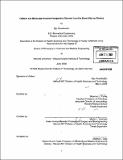Cellular and molecular immunotherapeutics derived from the bone marrow stroma
Author(s)
Parekkadan, Biju
DownloadFull printable version (32.55Mb)
Alternative title
Cellular and molecular immuno therapeutics derived from the bone marrow stroma
Other Contributors
Harvard University--MIT Division of Health Sciences and Technology.
Advisor
Shannon J. Turley and Martin L. Yarmush.
Terms of use
Metadata
Show full item recordAbstract
The bone marrow contains a multipotent stromal cell, commonly referred to as a mesenchymal stem cell (MSC). There has been recent interest in the clinical use of MSCs for cell-based therapy because: (1) bone marrow aspiration is a routine method used in medicine thereby allowing for easy accessibility to human MSCs; (2) MSCs are easily isolated and can expand to clinical scales in a relatively short period of time; (3) MSCs can be biopreserved without loss of potency and stored for point-of-care delivery; and (4) human trials of MSCs thus far have shown no adverse reactions to allogeneic versus autologous MSC transplants suggesting that therapy can cross histocompatibility barriers. This thesis describes the development of new modalities and indications for MSC-based treatments by leveraging the endogenous functions of these cells for therapeutic purposes. First, it is known that marrow stromal cells support hematopoiesis by secreting bioactive molecules that aid in the growth, differentiation, function and migration of hematopoietic cells within the marrow cavity. We show that these same secreted molecules derived from MSCs ex vivo can be formulated as an intravenous drug. In a D-galactosamine model of acute liver failure, a bolus injection of a concentrated form of MSC conditioned medium (MSC-CM) led to a significant survival benefit with a one week study endpoint. We employed in vitro and in vivo assays to demonstrate the effect of MSC-CM on leukocytes and resident liver cells. Traditional biochemical approaches were performed to identify active fractions within MSC-CM that were responsible for its therapeutic efficacy. As a corollary to an injectable drug, we developed MSCbased extracorporeal devices to serve as a dynamic source of MSC-CM in a dialysis-like setting. (cont.) Liver injured rats supported by extracorporeal bioreactors seeded with MSCs had significant improvements in liver serologies and survival in the short-term, whereas a composite device containing both MSCs and hepatocytes was shown to have a long-term survival benefit after 30 days. The second natural function of MSCs that was exploited for therapy concerns recent evidence that stromal cells can present antigens in lymphoid organs. We discovered that MSCs can express peripheral tissue antigens similar to other specialized antigen presenting cells in the thymus and lymph nodes - a process known to induce tolerance to self-reactive T cells in vivo. We show that MSC transplantation can be an effective treatment of intestinal autoimmunity in a chemically-induced model of colitis and a mouse model deficient in regulatory T cells. In addition, we demonstrate that MSC grafts increase the endogenous population of suppressor cells in vivo, which can potentially amplify and sustain the immunosuppression of the original transplant. The proposed work is significant, as development of such therapies for acute liver failure and inflammatory bowel disease would potentially treat an estimated 100,000+ newly diagnosed patients or ones who are refractory or contraindicated to standard-of-care medical/surgical procedures. These studies may empower the future use of MSCs in other organ failure syndromes and autoimmune conditions. Finally, exploration of the therapeutic functions of MSCs is expected to enhance our understanding of the mechanisms involved in cell therapy and give further insight to the natural functions of MSCs during health and disease.
Description
Thesis (Ph. D.)--Harvard-MIT Division of Health Sciences and Technology, 2008. Includes bibliographical references (p. 155-174).
Date issued
2008Department
Harvard University--MIT Division of Health Sciences and TechnologyPublisher
Massachusetts Institute of Technology
Keywords
Harvard University--MIT Division of Health Sciences and Technology.